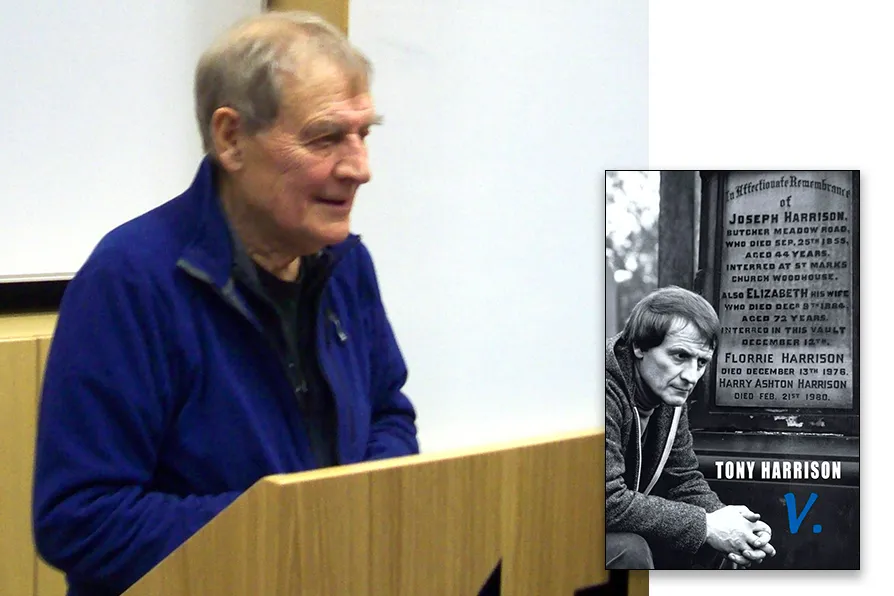SIMON PARSONS is charmed by a hilarious tender show that will open the eyes to the delights and possibilities of puppetry
ALAN MORRISON celebrates life and work of the late Tony Harrison, 1937-2025

 THE PEOPLES’ POET: Tony Harrison speaking at Teesside University Campus in Middlesbrough, 2015 [Pic: summonedbyfells/CC]
THE PEOPLES’ POET: Tony Harrison speaking at Teesside University Campus in Middlesbrough, 2015 [Pic: summonedbyfells/CC]
PROLIFIC socialist poet, playwright and verse-dramatist Tony Harrison passed away last Friday aged 88. His many works included The Loiners (1970), From the School of Eloquence (1978), A Kumkwat for John Keats (1981), The Gaze of the Gorgon (1992), and, of course, the controversial and groundbreaking cri de coeur against Thatcherite Britain, V (1985), written and published at the height of the miners’ strike.
Partly a response to finding obscene graffiti on his parents’ headstones in his native Leeds, the proliferation of slang and expletives throughout V demonstrated the breadth of Harrison’s fascination with language in all its forms.
Harrison’s roots were in the British proletarian literary tradition, particularly the strand that descended from the Chartist poets. Starting out as a working-class autodidact, he was elevated by a grammar school education, and went on to study the classics at Leeds University, which in turn influenced his early formalist and metrical approach to poetry.
This cultural clash, between a northern working-class background and a classical education, was symptomatic of many of Harrison’s generation, as memorably depicted, for example, in the anomic figure of Dennis Potter’s Nigel Barton (1965). Harrison was, like many other poets, playwrights and writers of distinction from similar backgrounds (not least the “Angry Young Men” and kitchen sink schools), a product of that all-too-brief oasis of meritocratic social democracy between 1945 and 1979.
Harrison’s early work focused much on this class-dislocated anomie and sense of being elocuted out of his working-class vernacular, perhaps most memorably in The Rhubarbarians: “Those glottals glugged like poured pop, each/ rebarbative syllable, remembrancer, raise/ ‘mob’ rhubarb-rhubarb to a tribune’s speech/ crossing the crackle as the hayricks blaze.”
Primarily a theatre and film poet, Harrison might also be seen as a grittier literary inheritor of the verse dramatist Christopher Fry. Lauded throughout his career for his political insights and ability to combine formal poetic eloquence with gritty and even scatological themes, Harrison demurred from his many literary accolades.
In 1999, when touted as a possible successor to Ted Hughes as Poet Laureate, Harrison promptly put paid to such a proposition with a long poem denouncing the establishment-patronage of poets, titled Laureate’s Block: “There should be no successor to Ted Hughes…/ Nor should Prince Charles succeed our present queen/ And spare us some toady’s ode on coronation.” In this sense, as in many others, Harrison put his socialist principles before personal promotion. A stalwart verse-dramatist of the National Theatre, Harrison was perhaps the closest we have come to a People’s Poet.

PAUL FOLEY picks out an excellent example of theatre devised to start conversations about identity, class and belonging













